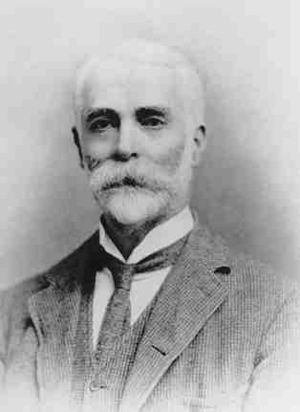Bernard Bosanquet (philosopher) facts for kids
Quick facts for kids
Bernard Bosanquet
|
|
|---|---|
 |
|
| Born | 14 June 1848 Rock Hall, near Alnwick, England
|
| Died | 8 February 1923 (aged 74) London, England
|
| Alma mater | Balliol College, Oxford |
| Spouse(s) |
Helen Dendy
(m. 1895) |
| Era | 20th-century philosophy |
| Region | Western philosophy |
| School | British idealism |
|
Influences
|
|
Bernard Bosanquet (born June 14, 1848 – died February 8, 1923) was an English philosopher and political theorist. A philosopher is someone who studies big questions about life, knowledge, and values. A political theorist thinks about how governments and societies should work. Bosanquet was very important in shaping ideas about politics and society in the late 1800s and early 1900s. His ideas were later looked at closely and sometimes criticized by other famous thinkers like Bertrand Russell and John Dewey. Bernard Bosanquet was married to Helen Bosanquet, who led the Charity Organisation Society.
Contents
Bernard Bosanquet's Life Story
Bernard Bosanquet was born at Rock Hall, near Alnwick, England. His father was a clergyman in the Church of England. Bernard went to Harrow School and then to Balliol College, Oxford for his education.
After finishing college, he became a Fellow at University College, Oxford. This meant he could teach and do research there. However, he later received a lot of money from an inheritance. He decided to leave his teaching job to focus completely on his philosophical research.
In 1881, Bosanquet moved to London. There, he became very active in two groups: the London Ethical Society and the Charity Organisation Society. These groups showed how he put his ideas about ethics (right and wrong) into practice.
Bosanquet wrote many books and articles on different topics. These included logic (how we reason), metaphysics (the nature of reality), aesthetics (the study of beauty and art), and politics. He was a key figure in a philosophical movement called "absolute idealism." This idea suggests that everything is connected and part of one big reality. He later preferred to call his philosophy "speculative philosophy."
He was also a leader in the "neo-Hegelian" movement in Britain. This means he was inspired by the German philosopher Georg Wilhelm Friedrich Hegel. Bosanquet was also greatly influenced by ancient Greek philosophers like Plato and Aristotle, and by German thinkers like Immanuel Kant. Some of his most famous books are The Philosophical Theory of the State (1899) and his Gifford lectures, The Principle of Individuality and Value (1912) and The Value and Destiny of the Individual (1913).
From 1894 to 1898, Bosanquet was the president of the Aristotelian Society, a group for philosophers.
Bosanquet's Ideas on Society and the State
Bernard Bosanquet was very interested in how individuals fit into the larger society or "state." He believed that everything in the world is connected. He thought that each person is part of a bigger whole, and that this whole is the most important reality.
In his book Philosophical Theory of the State, Bosanquet explored the connection between a person and the state they live in. He suggested that the state is like a "real individual" and that individual people are less real when compared to it.
However, Bosanquet did not think that the state should control its citizens too much. Instead, he believed that if society works like a living body, then its parts (the people) can work together naturally. He thought that society doesn't need a central power to force harmony. He felt that harmony would happen on its own if society was truly connected.
Bosanquet explained his ideas about freedom and society in his writings. He believed that true human freedom comes from being part of a spiritual or civilized world. Things like family, owning property, and laws are important steps in human freedom. They help people feel like they belong and have a purpose. As society grows, people live more in a civilized world and less in a wild, natural one. Our will, or who we are, grows with the rules and ideas that guide us. He thought it was wrong to see laws and rules as limits. Instead, he saw them as ways to expand what we can do.
Bernard Bosanquet's Writings
Books by Bernard Bosanquet
- A History of Aesthetic (1892, second edition 1904)
- Knowledge and Reality: A Criticism of Mr F H Bradley's Principles of Logic (1885)
- The Introduction to Hegel's Philosophy of Fine Art translated and edited (1886)
- Logic, or The Morphology of Knowledge in two volumes: Volume 1, Volume 2 (1888; revised edition 1911)
- The Civilization of Christendom, and other studies (1893)
- The Essentials of Logic, being ten lectures on Judgment and Inference (1895)
- A Companion to Plato's Republic for English readers (1895)
- Essays and Addresses (1889)
- Psychology of the Moral Self (1904)
- The Meaning of Teleology: a lecture read to the British Academy in 1906
- The Distinction Between Mind And Its Objects (1913)
Articles by Bernard Bosanquet
- Review of Benno Erdmann's Logik. Bd. 1. Logische Elementarlehre (Halle: Niemeyer 1892) by Bosanquet in Mind (1892), N.S. No. 2
See also
 In Spanish: Bernard Bosanquet para niños
In Spanish: Bernard Bosanquet para niños
 | John T. Biggers |
 | Thomas Blackshear |
 | Mark Bradford |
 | Beverly Buchanan |

